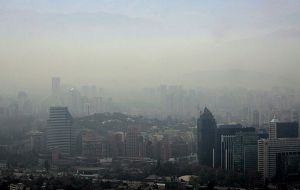MercoPress. South Atlantic News Agency
Santiago de Chile faces worst smog levels in eight years
 View of Santiago City with smog
View of Santiago City with smog Santiago de Chile's skies remained grey and smoggy Monday and Tuesday, and with no end in sight, former President Ricardo Lagos blamed the city's contamination levels on Argentina's unwillingness to provide Chile with more natural gas.
Santiago faced over the weekend this year's first environmental "pre-emergency" situation as air contamination reached its highest level since 1999. Chile is almost totally dependent on foreign imports of both natural gas and petroleum, and Argentina frequently reduces its gas exports during winter months when residential demand for domestic heating reduces its export supply. Chilean companies then resort to the burning of petroleum-based fuels to fuel factories and other commercial enterprises. Santiago's unique geography traps nearly all pollution in the valley in which the city lies, and only a rainy day will clear the air. Lagos, recently named one of three special climate change ambassadors by the UN, said Monday that Santiago's air would not be clean until a reliable supply of clean-burning natural gas could be found. "If you analyze what is going on with the gas we get from Argentina, you'll understand the situation," he told Environmental Minister Ana Lya Uriarte. "When you take away the gas, industry has to use the petroleum products that they have available," Lagos said, before adding that he would not comment on possible solutions. Lagos was widely criticized by Chilean environmentalists last week after accepting the new UN post that will have him travelling the world in the name of climate change for the next year. Twenty Chilean environmental NGOs signed last week a letter detailing the opinions of Chilean ecologists who argue that Lagos' government (2000 to 2006) "was totally insensitive to environmental issues". The letter condemned Lagos' efforts to combat smog in Santiago. "Lagos revoked the many advances made by previous governments," the letter said. "The health of Santiago was sacrificed to large companies." Santiago residents faced this year's first environmental "pre-emergency" situation last weekend, as air contamination reached its highest level since 1999. Last Saturday, the Particle Quality Index (ICAP) hit 409, well above the 300 required for the government to declare a pre-emergency. "Of all medical consultations, ten percent are caused by air contamination," said Pedro Astudillo, chief pediatrician at the Indisa clinic in Santiago. During pre-emergency situations, the elderly and the very young are advised to stay indoors because of their weak lungs. Smog can inflame breathing passages, decreasing the lungs' working capacity, and cause shortness of breath, pain when inhaling deeply, wheezing, and coughing. It can cause eye and nose irritation and dry out the protective membranes of the nose and throat and interfere with the body's ability to fight infection, increasing susceptibility to illness. Prolonged exposure to contaminated air can cause asthma and cancer. During winter months, the Santiago's Metropolitan Region issues regular information on air quality levels, which range from "good," with the IPAC at 0 to 100, to "emergency," when the IPAC is over 500. If the government declares an alert, it can restrict the use of vehicles without catalytic converters, which are main sources of contamination in the region. By Nathan Crooks The Santiago Times




Top Comments
Disclaimer & comment rulesCommenting for this story is now closed.
If you have a Facebook account, become a fan and comment on our Facebook Page!